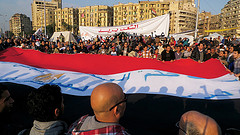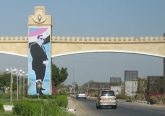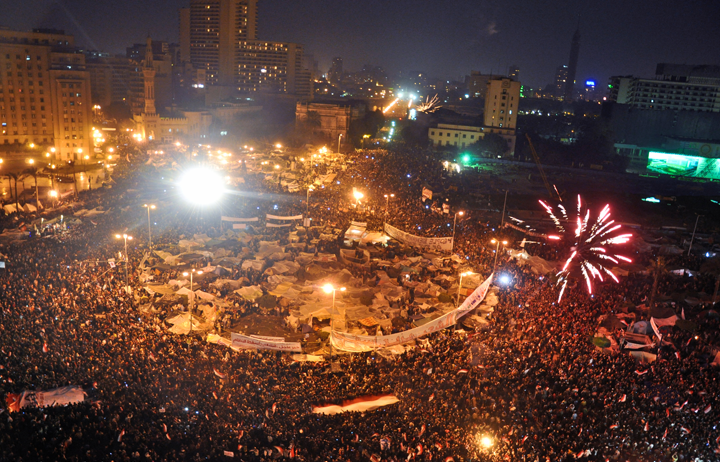
The Arab world shocked us twice in recent months, once with the eruption of the revolutionary spring, and again with the sweeping to power of Islamist parties. The revolutions have radically shifted the political map of the region and transformed the world’s perception of its politics, and even transformed the world. But the equally unanticipated, and very decisive, ascendancy of the Islamists, from Morocco to Kuwait, has confused many observers. Already some are repeating the old adage, voiced most provocatively by Elie Kedourie in 1992, that the Arabs do not comprehend, let alone desire or deserve democracy. It is interesting that Kedourie was responding to the results of an opinion poll which showed that the majority of Egyptians supported democracy, but also demanded the implementation of Shari’a (Islamic) law. It would appear that it was Kedourie who needed some schooling in democracy.
In order to make sense of these dichotomies, we may need to go back in time, to an encounter with an Iranian cleric in Istanbul in the spring of 1997. The conversation naturally drifted to the upcoming presidential elections in Iran, where a hitherto little known candidate by the name of Muhammad Khatami became a prominent candidate. My interlocutor was not enthusiastic about the man. ‘I fear,’ he complained, ‘that he would hand the country over to the Americans.’ A month later, Khatami was elected by a landslide. Apparently, the majority of Iranians did not agree, or did not mind the country being handed over to America.
Meanwhile, in Istanbul, the worry was of the country being handed over to Islamists. For the first time since the caliphate was abolished in 1924, the country was governed by a prime minister (Necmettin Erbakan), who was accused of being ‘Islamist’ (even though he continued to ‘deny all the charges’). For reasons that were not immediately apparent to me, I was besieged by a host of journalists who wanted me, of all people, to give them assurances that this was not going to happen. (I only discovered later that the interest was partly due to the fact that a Turkish edition of my book, Who Needs an Islamic State? was on sale outside the conference hall). The journalists, who spoke for the secular establishment, believed the people to be too gullible, and liable for seduction by Islamists. One predicted that the Islamists could take over within 20 years, unless they could be stopped. She was apparently over-optimistic.
In the years that followed, Iran and Turkey appeared to be in a race to offer a viable ‘Muslim’ democratic model; in both cases, the role of ‘moderate Islamists’ appeared to be crucial. The two countries, which had often been compared, were a mirror image of each other, as alternative theocracies revolving around hero worship. The portraits of Khomeini and Ataturk were ubiquitous, and foreign dignitaries are forced to pay homage at their shrines. You can criticise God or the Prophets, but you risk a lot if you hint opposition to either of the two great Founders. In both countries, the judiciary, military and security apparatus jealously defended the basic theological tenets of the system, while the bodies of women were the primary arena of contestation: in Turkey, they were punished if they sported Islamic dress; in Iran, if they did not. So for any of them to progress towards democracy, the grip of this theocratic apparatus needed to be somewhat loosened.
My money was on Iran at the time. It looked much more promising. Khatami’s first term witnessed important reforms and the flowering of a vibrant civil society. The forces of reaction were in retreat, and he won the second term in 2001 by an even bigger landslide. Everybody began to talk of the second Iranian revolution, and life began to stir in the Arab world. People began to ask ‘why can’t we do it here? Why could Iran have two remarkable revolutions in a generation, while things remain stagnant this side of the Gulf?’
In Turkey, by contrast, things did not appear to be going well. Erbakan was forced out of office under military pressure in 1997 in what was dubbed a ‘post-modern coup’, and his Welfare party was banned the following year. To make matters worse, the ban was supported by the European Court of Human Rights on appeal. Our host for the 1997 conference, the city’s mayor Recep Tayeb Erdogan, was sent to prison and stripped of his political rights for reciting a famous poem at a political rally. Turkey appeared to be headed towards dark days. In addition, Erbakan’s party became plagued by internal dissent, leading to the formation of a break-away party under the name of Justice and Development party (AKP)
Not to be outdone, the Iranian establishment also began to claw back the reforms. Here again, the judiciary and other ‘guardian’ establishments began to close down newspapers, prevent reformists from running for office, and imprison or even assassinate key figures in the reform movement. The culmination was to elect Mahmud Ahmadinejad for president.
Then something unexpected happened in Turkey. The breakaway ‘Islamist’ AKP, first encouraged by the military in order to weaken Erbakan, won a landslide victory in 2002, becoming the first party in decades to win parliamentary majority. It took the establishment some time to adapt to this shock. The rest, as they say, is history.
Unlike Khatami, the Turkish reformers played their cards right, and have since been presiding over a country that is becoming more democratic and prosperous as time passes. It also became a model of how to run a modern Muslim state that is at peace with itself, its heritage, the world and modernity.
Only Malaysia competed as a vibrant and prosperous polity, even though the Malaysian model began to sour somewhat after the Anwar Ibrahim episode of 1998.
This background is crucial to understanding the role of the Islamists in the Arab Spring. It is not that the rise of the Islamists has not been predicted. The despots from Mubarak to Asad had continued to warn that it was they or the Islamists. They have convinced sections of their populations, and Western governments, that they were the safer bet. Developments in Algeria in the early 1990s, and in Palestine more recently, had lent credibility to this act of blackmail.
However, in the period since 1997, a lot has changed, including the Islamists. Inspired by the Khatami experiment and the AKP model, the idea of an Islamist-led democratic order became attractive not only to the Islamists, but to many liberals as well. During the same period, the so-called ‘secular’ regime became much nastier, more corrupt, more despotic and without legitimacy. Believing that they had destroyed the Islamist movements through decades of intense persecution, they have now turned their over-developed security apparatus against their erstwhile liberal allies.
As a result, a rapprochement began to develop between Islamists and their secular rivals. First, it was Islamists and Arab nationalists who decided to come together in the early 1990s, following the second Gulf War. Then broader coalitions of Islamists and liberals began to emerge within the context of mass pro-democracy movements, such as kefaya (Enough!) in Egypt (2004) and the 18 October group in Tunisia (2005). From then on, the scene was set for mass democracy movements.
However, the Islamists were not yet ready to seek power. All they desired was an end to persecution and the freedom to operate legally. The people, however, have decided to turn the Arab Spring into an Islamist revolution without the Islamists planning that or desiring it.
When the Tunisian Islamist leader Sheikh Rachid al-Ghannoushi planned his return home in early 2011, after two decades in exile, a lot of choreographing went into the preparation for the trip, precisely so as not to look like Khomeini’s return from exile. The newly established government of his name-sake, Muhammad al-Ghannoushi, still possessed by the anti-Islamist paranoia of the regime it inherited (and in part still represented) was keen for the return to be a low-key affair. It pleaded with Ghannoushi to keep a low profile, lest the delicate transition be destabilised. Ghannoushi has spent the past two decades distancing himself from the two contemporary – and rather disastrous – Islamic experiments: those of Iran and Sudan.
It is interesting that when I visited Tunisia in the mid-1980s, I have found the young Islamists in the University fascinated and inspired by both the Islamist revolution in Iran and the Sudanese Islamist movement. But what captured their imagination then were Ali Shariati’s inspirational writings, and Hassan Turabi’s pragmatism, in particular his advocacy of democracy and women’s rights, which appeared appropriate to the Tunisian context. Since then, however, Tunisian Islamists shared the widespread disillusionment with both the Islamic revolution and the trajectory of Sudanese Islamism.
So the last thing Ghannoushi wanted was for his movement to be associated with Khomeinism, even if only symbolically. He gave many interviews to emphasise the distinction, and to affirm his commitment to pluralism and democracy, and to categorically deny any intention to set up an Islamic order in Tunisia. He delayed his return as much as possible to give the new government time to settle in, and he made sure that he was dressed in a suit, rather than donning the traditional Tunisian garb. Also his followers stopped calling him ‘Sheikh’, and now use the more neutral term ustaz instead.
However, the elaborate efforts put into making his homecoming a very low-key affair were completely unsuccessful. Tens of thousands of enthusiastic supporters turned up to great the Sheikh. It was of course well short of the four million plus who turned up to greet the Ayatollah in February 1979, but it was an indication of things to come. No other exiled or resident opposition leader could inspire that much enthusiasm or adulation. It was also symbolic of the trajectory of all other Arab Islamist movements. They all received more popular support than they had hoped for, or even wanted.
This could have disastrous consequences, if the Islamists fail to rise to the challenge. We have seen it all before. In Algeria between 1989 and 1992, the FIS unleashed a tidal wave of popular enthusiasm far beyond what the young movement could handle, and the whole unplanned rise led to a disastrous collision with the entrenched, French-backed military. It happened again in Palestine in 2006, when Hamas sleep-walked into shouldering a responsibility it did not want and was not prepared for, for governing the Occupied Territories, also with unwelcome consequences for everybody.
There are signs that the Islamists, inspired by the positive Turkish model, have learned the lessons of those disastrous experiments, as well as those of Iran and Sudan. So they have made a more explicit and categorical commitment to democracy, and gave assurances that they would not unilaterally pursue any ‘Islamisation’ measures. They have also become adept at coalition building and careful not to move beyond or ahead of the consensus of ‘centrist’ political opinion.
However, the problem in the past has not been Islamism per se, but the contextual ambiance which caused the leadership of Islamist movements to lose control. In Algeria, both the tide of victory and the deluge of violence took the mainstream Islamist movement by surprise. When the FIS won a landslide victory in the 1991 parliamentary elections, all its top leadership was in jail; it was also its salafi rivals who unleashed the violence that followed annulment of the results, sucking the radical fringe of the movement in with them. The current tide of pro-Islamist popular sentiments is not all controlled by the Islamist mainstream.
It is ironic here that western policymakers have, until the revolutions erupted, regarded Islamists with more than suspicion until now, refusing to talk to them and doing all that is possible to block their admission to mainstream politics. The current configuration has shown how erroneous this position had been. Salafis and other ‘extremist’ groups have been catapulted to the mainstream as close competitors to traditional Islamists who now appear to be the ‘moderates’, sending Western governments scrambling to do business with them. This delay will certainly have its costs.
But the Islamists are also struggling to capture the agenda, and the assurances they kept giving about holding back and avoiding to push their agenda are no longer adequate. They must have an agenda and must push it, and this agenda must be compatible with stability and good governance.
Abdelwahab El-Affendi is Reader in Politics, Centre for the Study of Democracy, University of Westminster, and ESRC/AHRC Fellow in RCUK’s Global Uncertainties Programme. He is also currently Visiting Fellow at the Centre of Islamic Studies, University of Cambrdige.







No Comment